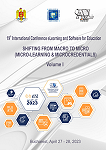TOWARDS ACCESSIBLE PLAYER EXPERIENCES
TOWARDS ACCESSIBLE PLAYER EXPERIENCES
Author(s): Ioana Andreea Ștefan, Antoniu Ștefan, NEIL JUDD, Lawrence HOWARD, Jannicke Baalsrud-Hauge, Cătălin Radu, Olivier HeidmannSubject(s): Education, Educational Psychology, Developmental Psychology, Neuropsychology, ICT Information and Communications Technologies
Published by: Carol I National Defence University Publishing House
Keywords: customization; neurodevelopmental disorders; serious games; INCLUDEME;
Summary/Abstract: The path towards digital accessibility in educational setting has proved to be a challenging one. Accessibility has been considered too hard to achieve and the accessibility standards requirements have been considered too difficult to meet. As a result, asignificant amount of digital education resources have limited to no accessibility features. Digital Education Games represent a telling example of how problematic accessibility remains. However, statistics shows how critical digital accessibility is. Access to education should be provided to every individual, regardless of his/ her disability even if his/ her disability falls under the cognitive disabilities specrum. Cognitive disorders include individuals with mild to severe dyslexia, with attention-deficit disorders, such as ADD or ADHD, and anyone with an information-processing disorder. This paper tackles issues concerning the design of accessible games and presents examples of serious games created for learners with cognitive disabilities. The research target games as most games are applications delivered as such, with limited or no customization features that address specific accessibility-related player needs. The design patterns presented herein consider the fact that some learners respond better to audio and visual cues, while others get distracted by the visual elements of videos, or might have issues with auditory processing. In this context, the authors discuss the need for maintaining consistent user experiences across the digital learning activities, as well as the necessity to provide more flexible applications, including games, that include at least basic customization features a teacher can use to adapt a game to specific, critical learner needs.
Journal: Conference proceedings of »eLearning and Software for Education« (eLSE)
- Issue Year: 19/2023
- Issue No: 01
- Page Range: 69-78
- Page Count: 10
- Language: English

